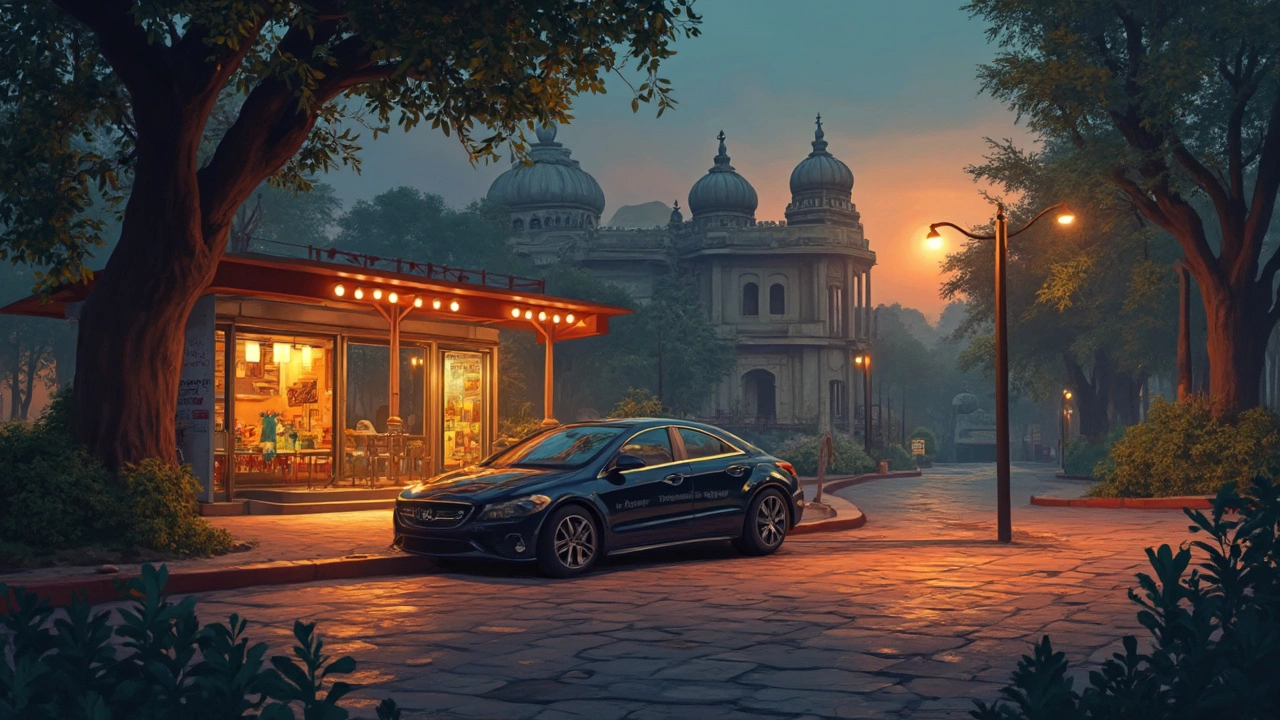
- Created by: Lydia Carmichael
- Completed on: 16 Feb 2025
- Categories: Homeless Support
So, you're trying to figure out where sleeping in your car is not just a spot but a safe haven? You're not alone, and the good news is there are spots out there that can offer you a bit more peace of mind. Before parking, it's essential to understand the local laws because nobody wants a knock on the window in the middle of the night. Some cities have specific rules about overnight parking, and fines can be steep. Always keep an eye out for those 'No Overnight Parking' signs.
Once you're clear on the rules, where do you park? Well, rest stops along highways are a decent choice. They're designed for breaks, and you often find other overnight travelers here, which could add a layer of security. Some places like 24-hour supermarkets and certain big-box stores also allow overnight parking. Just give them a courtesy call to check if it's okay first.
Understanding Local Laws
When it comes to sleeping in your car, getting a good night’s rest isn’t just about comfort—it's about staying on the right side of the law. Local regulations can vary significantly from one place to another, which means what might be perfectly fine in one town could get you a ticket elsewhere.
First off, always check for posted signs that restrict parking or overnight stays. No one wants to wake up to a fine or, worse, towed car. In some cities, there's an outright ban on sleeping in vehicles, so it's crucial to know what's allowed before settling in.
Check City and State Regulations
Some states are more lenient, particularly those with major highways lined with rest stops. These are usually designed for long-haul drivers, so a brief overnight stay won’t usually raise eyebrows. However, urban areas can be stricter due to safety and community concerns. Make a habit of checking online for each city's specific rules or call their local community resources for guidance.
Use of Rest Stops
Rest stops are often a grey area. Places like California legally allow you to stay up to eight hours in a rest area, providing a short-term solution if you’re on the move. But remember, it's not a place to set up camp; it’s just for catching up on sleep.
Homeless shelters might also have resources that outline legal parking areas or even permits for temporary vehicle living. Some cities have programs particularly for this, so it’s worth checking in.
Legal Parking Zones
Neighborhoods with ‘residential parking only’ signs are generally a no-go. Instead, look for commercial areas where parking might be more relaxed after business hours. Certain big-box stores welcome overnight campers, but be sure to ask permission first.
Here's a quick reference table on parking legality in some areas:
| State | Rest Stop Policy |
|---|---|
| California | 8-hour limit, no camping |
| Texas | 24-hour limit, popular for truckers |
| New York | Varies by location, check local signs |
The bottom line? Do your homework. A little research can save you a lot of hassle, letting you focus on getting some rest.
Ideal Parking Spots
Finding the right spot to park overnight is crucial when you're planning to sleep in your car. It’s not just about legality, but comfort and security too. Let's break down some ideal spots you might consider.
Rest Areas on Highways
These are often the first choice for many. Rest stops are designed for travelers to take a break, which makes them an appealing option for car camping. They're usually equipped with restrooms and vending machines. Some states allow overnight parking while others don’t, so it’s wise to check the rules for each state you travel through.
24-hour Commercial Parking Lots
Places like Walmart and certain big box stores have been known to allow overnight parking. Not every location offers this though, so it’s always a good call to ask the store manager or security staff. These lots are typically well-lit and have video surveillance, adding a level of security that's hard to beat.
Truck Stops
Truck stops provide amenities like showers, food, and fuel – and they're open 24/7. They are generally bustling, so there’s a sense of safety in numbers. However, it’s crucial to be respectful of the space, as truckers need it to rest. Just find an area where cars usually park, and you should be good to go.
Campgrounds and RV Parks
If you're looking for a bit more tranquility, consider campgrounds. They're tailor-made for overnight stays, though usually at a small fee. These spots can offer plenty of convenience, often including bathroom facilities. And let's face it, a proper restroom is a blessing.
Specific Parking Suggestions
Some cities even have designated street areas or parking lots where overnight parking for car-sleepers is allowed. Doing a quick online search for 'car camping locations' followed by the city name can give you insights on these places. Community forums or apps like Allstays can be useful tools to find these spots.
Remember, the safest places aren't always the most obvious. Sometimes a residential area that allows street parking can be a quiet, undisturbed choice. Just ensure you're not blocking driveways or violating local parking restrictions.

Safety Precautions
Staying safe while sleeping in your car is priority number one. Let's talk about some essential steps you can take. First off, always lock your doors. It's an obvious tip, but you'd be surprised how often it's missed when setting up for the night. Keeping your windows cracked slightly can be good for airflow, but there's no need to overdo it, and make sure any open windows are not an invitation for trouble.
Stay Alert and Choose Wisely
Picking the right spot is half the battle. Well-lit areas are crucial since they deter any sketchy activities. If possible, try to get under a light but not so close that you’re under constant surveillance. Small towns can often offer quieter, safer locations compared to bustling city centers.
"Trust your gut. If a place doesn’t feel right, it probably isn’t," advises Jane Doe, a well-known author on urban survival strategies.
Blend In
The idea is to keep a low profile. Don’t attract attention with flashy decorations on your car or loud music. If your car looks like it's staying long-term, it can invite unwanted attention. Using sunshades or curtains can help with privacy, but don’t make it obvious you’re camping out completely.
Personal Safety Measures
Having a plan for self-defense is worth considering. We're not talking about getting into fights, but simple things like a whistle or car alarm app can make a difference. The goal here is to make yourself a harder target than someone else, and most times that's enough.
| Do's | Don'ts |
|---|---|
| Lock doors | Park in dark alleys |
| Use shades for privacy | Show signs of long-term stay |
| Trust your instincts | Ignore neighborhood vibes |
Remember, the key to being safe while sleeping in your car is preparation and vigilance. By taking these safety precautions, your nights on the road can be much more secure.
Overnight Options
When you need to catch some sleep in your car, knowing your overnight options can make all the difference. Let's talk about some of the places that are safe, legal, and sometimes surprisingly convenient for a night's rest.
Rest Stops
Rest stops aren't just for quick bathroom breaks. They can be your go-to spot for a night’s sleep. They’re well-lit, often patrolled by highway security, and best of all, open 24/7. Highway rest stops in many states allow overnight parking, though they might have a limit, like 8 hours, to keep the traffic moving.
Walmart Parking Lots
You’ve probably heard this one: certain Walmart parking lots allow overnight parking, especially those that are open 24/7. Though not an official company policy, many managers don't mind as long as you’re discreet and park away from the main entrances. Always check with the store manager before settling in for the night.
Couchsurfing and Apps
While it might sound odd for a car-sleeper, some apps like Couchsurfing have communities willing to share their driveways. It adds a sense of safety and you might even make a friend over a morning coffee.
Casinos
Casinos sometimes offer free overnight parking. They're open all night, have security surveillance, and might even have facilities you can use, like restrooms. Just check in with security when you arrive.
Truck Stops
More than just pit stops for big rigs, truck stops like Pilot or Love’s welcome travelers. These spots usually have showers, restrooms, and food. A good night's rest can't be overrated when you're on the road.
It's vital to ensure your spot is both legally sound and feels safe. Be aware of the surroundings, trust your intuition, and when in doubt, move on to a safer place. Remember, your safety is worth the effort of driving a little further for the safest places to park and sleep.

Tips for Comfort
Getting comfortable in a car isn't something we're taught, but when life throws a curveball, it's a skill worth mastering. Prioritizing comfort can make your mobile abode feel a bit more like a home, even if it's just for the night.
Maximize Sleeping Space
No one likes being cramped, especially when sleeping. First, try adjusting your car's seats to make as much room as possible. If you're in a hatchback or SUV, folding down the seats can give you a flat surface. Adding a sleeping pad or inflatable mattress can do wonders for your sleep quality, reducing aches and making it cozier.
For smaller cars, recline the passenger seat as far back as it goes. Lay out soft blankets and an extra pillow, which can help you catch some sleep in your car comfortably. Remember, even an old yoga mat can offer cushion, so use what you have.
Temperature Control
Cars are notorious for turning into ovens or iceboxes depending on the weather outside, so maintaining a comfy temperature is key. On hot nights, park in the shade and crack the windows slightly. You can hang a wet towel to cool down the interior or use a battery-operated fan for circulation.
| Temperature Tips | Action |
|---|---|
| Cold Weather | Use a quality sleeping bag; wear layers; insulate windows with sunshades. |
| Hot Weather | Use a reflective sunshade; park in the shade; use a fan for ventilation. |
Organize and Declutter
A cluttered space can be stressful, so keeping your car organized will make a significant difference. Store essentials, like toiletries and food, in easily accessible containers or bags. Consider organizing items by frequency of use, with daily essentials within arm's reach.
- Food and Water: Keep ready-to-eat, non-perishable snacks and plenty of water handy.
- Clothes: Roll clothes to save space, and have a laundry bag ready for dirty garments.
- Miscellaneous: Keep flashlights, tools, and an emergency kit within easy reach.
By following these tips, you'll be one step closer to making a safe and comfortable haven in your car, no matter where you park for the night.